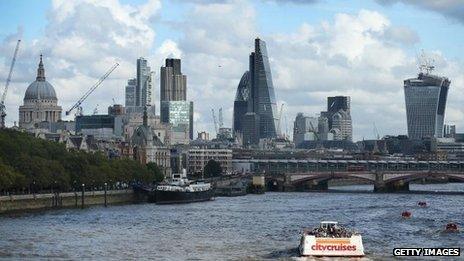Centre for Cities says economic gap with London widening
- Published
- comments

London has accounted for 80% of private sector job growth since 2010, the report says
The economic gap between London and the rest of the UK is widening because other cities are "punching below their weight", according to research.
London has created 10 times more private sector jobs than any other city since 2010, analysis by the Centre for Cities found.
The think tank is calling for more power to be devolved to the regions.
Its research, external found almost a third of people aged between 22 and 30 who moved cities headed for London.
Manchester 'underperforming'
London appears to "suck talent from the rest of the country", the report says, with many young people never returning to their home towns.
Edinburgh and Birmingham were the next best performing cities in terms of private sector job creation, with Aberdeen also featuring in the top ten.
A Scottish government spokeswoman said the report was "further evidence" Scotland could succeed as an independent country.
Barney Crockett, the leader of Aberdeen City Council, said the city was "key" to the UK.
"The city is renowned for successful business start-ups and its strength has been widely remarked on during the past few years, because where many other areas have struggled and watched helplessly as businesses have folded around them, we have seen private firms develop and grow in strength," he said.
Paul Swinney, senior economist at the Centre for Cities, said the performance of London was good for the UK economy.
He said: "It's one of the best performing cities in the world and from a national perspective we need to continue supporting the growth of London.
"The bigger issue is the underperformance of our next largest cities, such as Sheffield and Manchester.
"They're very much punching below their weight in terms of their contribution to the national economy."
Alexandra Jones: UK "one of the most centralised countries" in the OECD
Researchers found "welcome signs of growth" in Edinburgh, Birmingham and Liverpool where "significant numbers" of private sector jobs had helped to offset some of the impact of public sector job losses.
The areas of Greater Manchester and Greater Leeds both contributed more to the UK's economy than the whole of Wales, Centre for Cities said, while Bristol had lost 13,900 private sector jobs in the period, more than any other city.
Business leaders in Bristol said the job figures used in the report were "at odds" with data from the Office for National Statistics.
But Mayor George Ferguson agreed with the report's assertion that cities needed more control over spending.
"Bristol is currently the only major city in England outside the south east to make a positive contribution to the UK economy," he said.
"The reported job losses up to 2012, whether accurate or not, only serve to stimulate my determination to create and attract more business."
Cities minister Greg Clark said large urban areas were essential for national prosperity "in a world where cities are increasingly competing against others around the world for jobs and investment".
Mr Clark said the report, which he said used data up to September 2012, reflected the reasons the government introduced its city deals programme - to hand more powers to cities to drive growth.
"Since then, the cities have gained momentum," he added.
"In the last two years the UK has created over a million jobs, of which over 750,000 are outside London. City Deals and Local Growth Deals will unleash the potential for cities to stimulate growth and create jobs around the country."
- Published27 January 2014